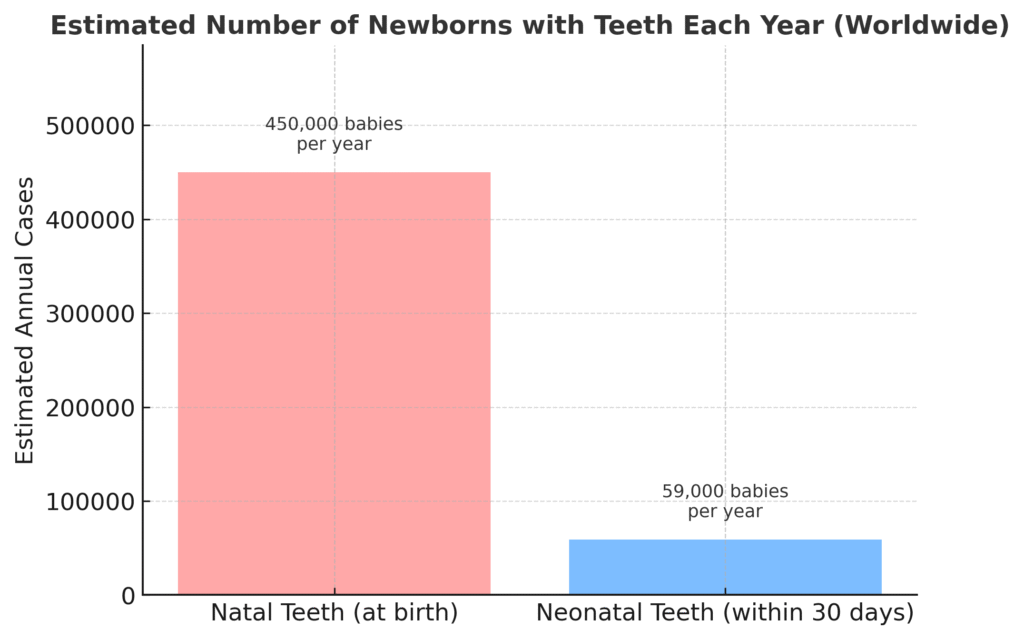Picture this: you’re holding your precious newborn for the first time, and you notice something unexpected – a tiny white speck in their mouth. Is that… a tooth? If you’re experiencing this surprise, you’re not alone. While most parents expect their babies to start teething around six months, some little ones come into the world with teeth already making their debut.
Understanding Newborn Teeth Buds: The Science Behind Early Smiles
What Are Tooth Buds and When Do They Form?
Long before you ever see your baby’s first smile, something incredible is happening inside the womb. Newborn teeth buds – the microscopic beginnings of your child’s future teeth – start their journey incredibly early in pregnancy.
These tiny tooth buds begin forming around the 7th week of pregnancy, when your baby is still smaller than a grape. It’s amazing to think that while you’re perhaps just discovering you’re pregnant, your baby’s future smile is already taking shape at a cellular level.
The Development Timeline of Newborn Teeth Buds
By the time you reach your third trimester, something remarkable happens. Advanced imaging technology allows doctors to actually see these developing newborn teeth buds on scans. Research shows that by week 34 of pregnancy, over 90% of your baby’s primary tooth buds are already visible on MRI scans.
This means your baby’s complete set of baby teeth – all 20 of them – are quietly developing long before birth. The newborn teeth buds are essentially tiny blueprints, containing all the genetic information needed to create healthy teeth.
Natal and Neonatal Teeth: When Newborn Teeth Buds Appear Early
The Difference Between Natal and Neonatal Teeth
Sometimes, those carefully developing newborn teeth buds decide to make an early appearance. When this happens, we use specific terms:
- Natal teeth: These are teeth present at birth, having emerged from newborn teeth buds before delivery
- Neonatal teeth: These appear within the first 30 days of life, as newborn teeth buds complete their development shortly after birth
How Common Are Early-Emerging Newborn Teeth Buds?
You might be wondering just how rare this phenomenon is. According to a comprehensive 2023 study that analyzed thousands of cases worldwide, here’s what we know:
- Natal teeth occur in approximately 1 in every 289 babies
- Neonatal teeth appear in about 1 in every 2,212 babies
To put this in perspective globally, with roughly 130 million births worldwide each year:
- About 450,000 babies are born annually with natal teeth from early-developing newborn teeth buds
- Approximately 59,000 babies develop neonatal teeth in their first month

What Parents Should Know About Early Newborn Teeth Buds
Are These “Extra” Teeth?
One of the first questions parents ask is whether these early arrivals are additional teeth. The good news is that in most cases, these teeth emerging from newborn teeth buds are actually part of your baby’s normal set of 20 primary teeth – they’re just arriving ahead of schedule.
Why Do Some Newborn Teeth Buds Develop Faster?
The exact reason why some newborn teeth buds develop more quickly than others isn’t fully understood. Researchers believe it may be related to:
- Genetic factors passed down through families
- Hormonal influences during pregnancy
- Individual variations in development timing
- Nutritional factors during pregnancy
Potential Concerns With Early-Emerging Newborn Teeth Buds
Common Issues Parents Face
While having a baby born with teeth isn’t usually dangerous, there are some practical considerations:
Feeding Challenges: Early teeth from newborn teeth buds can sometimes make breastfeeding uncomfortable for mothers or interfere with bottle feeding.
Loose Teeth: Because these teeth emerge from newborn teeth buds earlier than intended, they may not be fully developed and could be somewhat loose.
Tongue Irritation: Sometimes called Riga-Fede disease, this occurs when the tooth repeatedly rubs against the baby’s tongue, creating a sore spot.
Choking Concerns: If a tooth from early newborn teeth buds becomes very loose, there’s a small risk it could come out and pose a choking hazard.
When to Seek Professional Help
If your baby is born with teeth or develops them in the first month, it’s important to have them evaluated by a pediatric dentist or your baby’s doctor. They can assess whether the teeth emerging from newborn teeth buds are:
- Properly rooted and stable
- Causing feeding difficulties
- Creating any oral health issues
- Part of the normal tooth set or supernumerary (extra) teeth
Managing Early Newborn Teeth Buds: Treatment Options
Conservative Approach
In many cases, if the teeth from newborn teeth buds are stable and not causing problems, the best approach is simply to monitor them carefully. These teeth often remain perfectly functional as your child grows.
When Intervention May Be Needed
Sometimes, a pediatric dentist might recommend:
- Smoothing rough edges to prevent tongue irritation
- Removal if the tooth is very loose or causing significant feeding problems
- Special feeding techniques to make nursing more comfortable
Caring for Early Teeth from Newborn Teeth Buds
Even though your baby is very young, these early teeth still need gentle care:
- Clean the tooth gently with a soft, damp cloth
- Monitor for any signs of irritation or looseness
- Continue regular pediatric checkups
- Discuss feeding strategies with your healthcare provider
The Emotional Side: Supporting Parents Through the Surprise
You’re Not Alone
Discovering that your newborn has teeth can be overwhelming. Many parents experience a mix of surprise, concern, and curiosity. These feelings are completely normal and valid.
This Doesn’t Mean Something’s Wrong
It’s crucial to understand that having teeth emerge from newborn teeth buds early is simply a variation in normal development. It doesn’t indicate any underlying health problems or developmental delays.
Building Confidence as a Parent
Learning to care for a baby with early teeth from newborn teeth buds might feel daunting at first, but with proper guidance and support, most families adapt quickly. Remember that thousands of parents worldwide navigate this same experience each year.
Looking Ahead: What This Means for Your Child’s Future
Normal Tooth Development
Having early teeth from newborn teeth buds doesn’t typically affect the timing of when your child loses their baby teeth or when their permanent teeth come in. The natural progression usually continues as expected.
No Long-term Complications
Most children who are born with teeth or develop them early from newborn teeth buds go on to have completely normal dental development throughout childhood and beyond.
The Importance of Good Oral Hygiene
Whether your child’s teeth arrive early or on schedule, establishing good oral hygiene habits from the beginning is essential for lifelong dental health.
Final Thoughts: Embracing Your Baby’s Unique Journey
Every child’s development is unique, and the early emergence of teeth from newborn teeth buds is just one of the many ways babies can surprise us. While it might not be what you expected, it’s simply your child’s individual way of beginning their journey into the world.
The most important thing is ensuring your baby is comfortable, healthy, and getting the appropriate care they need. With proper professional guidance and your loving attention, this early dental development can be managed successfully.
Remember, your baby’s smile – whether it arrives early or on schedule – is something to celebrate. Those tiny teeth emerging from newborn teeth buds represent the beginning of a lifetime of smiles, and that’s truly something special.
Resources
- Vitali, F.C. et al. (2023). Worldwide prevalence of natal and neonatal teeth: Systematic review and meta-analysis. JADA. PubMed link
- Kunzendorf, B. et al. (2020). Comparison of the Visibility of Fetal Tooth Buds on 1.5 and 3T MRI. Journal of Clinical Medicine. MDPI link



